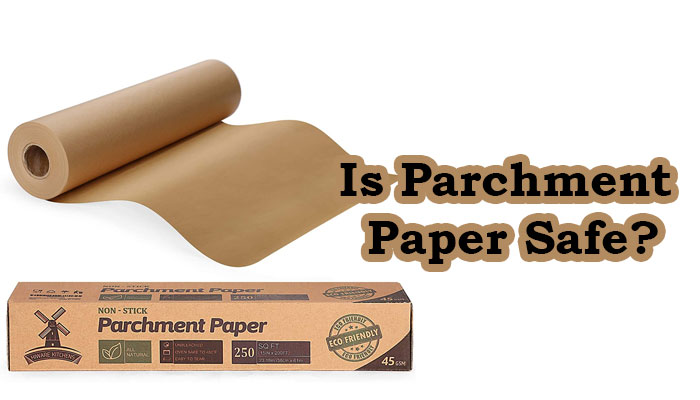Can Dogs Eat Turkey Bacon? Is It OK For Dogs or Not?
- By Infoik
- 15 Dec, 2021
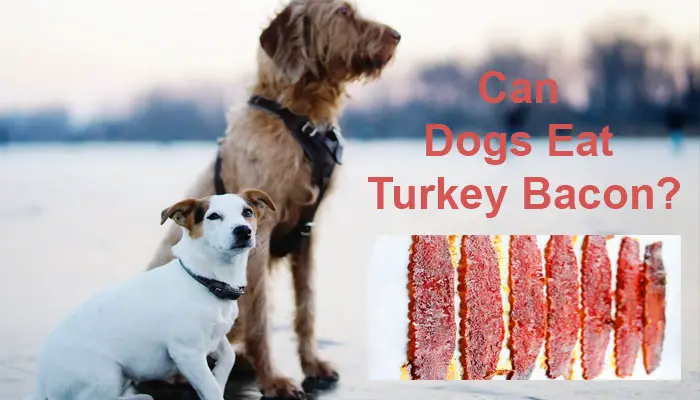
Dogs can eat turkey bacon, but should they?
Bacon is the favorite human food and dogs alike. Dogs love to eat all forms of bacon, including raw turkey bacon which might be safe for canines but contains artificial additives like fat that could be toxic if your pup has an upset stomach or sensitive digestive system.
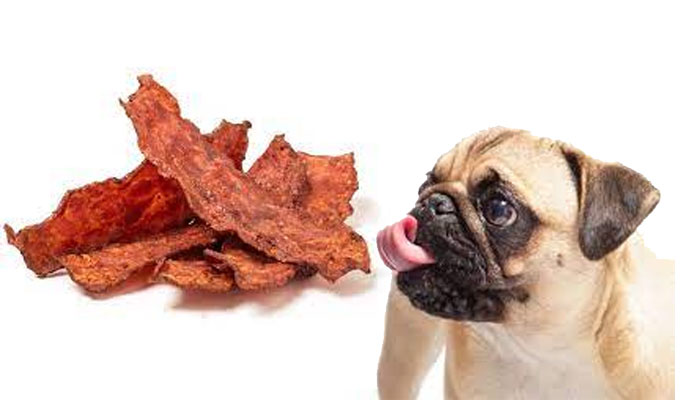
Dogs are omnivores, so they’ll happily consume anything from meatballs in tomato sauce to vegetables dipped into a creamy pea pesto dressing. But, of course, a healthy pet need not mean boring meals.
Whether you’re looking for a healthier alternative to pork bacon or want something new altogether, turkey is the way forward. Our experts will tell all about this tasty treat that can help keep your pup’s diet healthy!
Can Dogs Eat Turkey Bacon?

Turkey bacon is a more beneficial alternative to other forms of pork bacon, but it may not be suitable for your dog if you feed them too much. Turkey contains high levels of proteins and fatty acids, which can make their coat shiny while also boosting energy level; however, feeding this stuff regularly could harm doggy because there’s sodium present as well! So choose wisely – safer than sorry: stay away from processed meats like hot dogs or commercial dog foods containing turkey bacon; although these have little fat.
To confirm your pup gets the best treatment possible, always choose one with low-sodium and uncured variety. You can also avoid artificial flavors or additives that are toxic for dogs!
Is Turkey Bacon okay for dogs?

Turkey bacon is a popular healthy food for dogs, but the health benefits are not as great as those found with other forms of pig meat. In addition, it’s important to note that it may contain more salt and fats, which can be harmful if fed too often or in large amounts; pet nutritionists suggest offering only less frequently, so you don’t overdo your dog’s sodium intake!
When giving your dog any treat, always follow the 10% rule. For every serving size of food or drink, you offer them, it should only account for ten percent (10%) of their regular healthy diet!
Is regular bacon Good For My Dog?
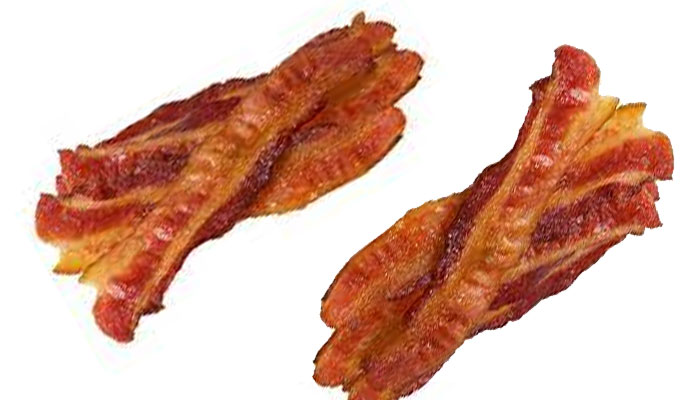
Make sure to watch out for your dog when it comes to bacon! Pork bacon is not suitable for canines due to its high fat and salt content. This could lead them to have an upset stomach, or even worse: pancreatitis -a dangerous condition in which digesting fats breaks down too fast, causing swelling of the pancreas tissue that blocks ducts leading into other organs.
Bacon can cause a dog to have an unnatural thirst, which is why you should always make sure they drink enough water. Bloat occurs when there’s too much salt in their diet, and it could be deadly if ignored! Offer your pup only special occasions treats because giving them more often than not will become harmful for both of us.
What About Other Processed Turkey Meats? Can My Dog Eat Those?
The World Health Organization has published a notice about the dangers of feeding your dog processed meats such as turkey pastrami or sausages. While these ingredients aren’t toxic for dogs, they contain tons of salt, which can lead to bloat and other health problems if consumed in too high quantities by pets like yours!
While it won’t injure your dog to eat a small piece of turkey from time to time, you shouldn’t make this into an occasional habit.
How Should I Provide My Dog Turkey Bacon?
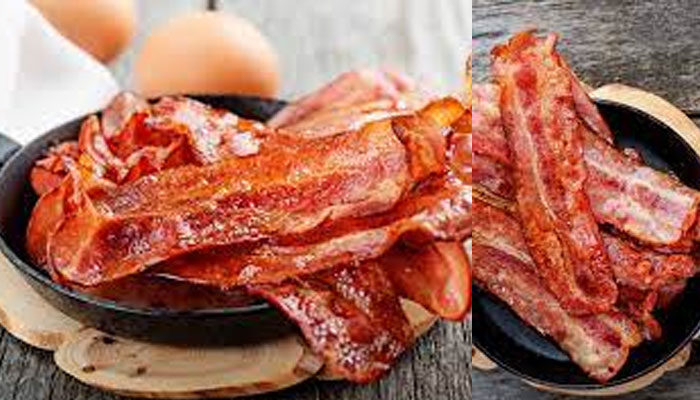
Turkey bacon can be provided to a dog in moderation. It shouldn’t be their primary protein source, but it makes for an exciting addition when you’re forced to give them something! When selecting turkey bacon from the store, try and find low-sodium varieties with no added sugar or salt – this will keep your pup’s kidneys healthy and reduce his risk of heart disease down the road. And if he seems interested enough, let him have some licks out of that skillet after cooking Bacon grease tastes salty, so don’t do what leads to getting sick later on!
You can use small pieces of turkey bacon as a high-value bacon treat to help build positive associations with things your dog fears or dislikes. Make sure it stays special (and avoid giving them too much) by not using this whenever you train! A few Mallory Street™ sprinkled on top for their regular diet meal is another option; we recommend serving up some tasty treats that will spark interest in even pickiest eaters – be mindful about how many calories there are per serving, so they don’t overdo it.
Turkey Bacon Serving Suggestions
Before serving your dog turkey bacon, talk to your veterinarian to ensure it is the best food for your pup. Some veterinarians may suggest avoiding turkey bacon altogether because of the high-fat content. If your vet gives you the okay to feed your dog turkey bacon, do so in moderation and always cook the bacon thoroughly to avoid the risk of food poisoning.
When feeding your dog turkey bacon, start by giving them a small piece to see how they react. Some dogs may tolerate turkey bacon just fine, while others may experience digestive upset. If your dog has no adverse reaction to turkey bacon, you can continue feeding it to them in moderation.
When feeding your dog turkey bacon, always cook the bacon thoroughly to avoid the risk of food poisoning. Turkey bacon can be cooked in the oven, on the stovetop, or even in the microwave.
You Can Also Read These Articles:
- Can Dogs Eat Corn Nuts? (Merits And Demerits Of Corn Feeding)
- Can Cats Eat Doritos? Good Or Bad Explained!
- Can Squirrels Eat Chocolate? Wildlife Feeding Guide For 2022
- Can Guinea Pigs Eat Blueberries? (Benefits, Risks & Serving Size)
FAQ:
How much turkey bacon can my dog eat?
Dogs love to eat turkey bacon, but it should always be cooked before feeding it to your pup. Some dogs can handle one slice, while others need a whole slab of the stuff because their size varies according to what species you have! To keep things safe for all parties involved, consider making this dish at home or giving smaller slices so that no one gets hurt in an unfortunate accident with raw meat.
Is turkey toxic to dogs?
Turkey is not toxic to dogs. On the contrary, it provides many essential nutrients like protein and riboflavin! Turkey can be a critical part of your dog’s diet when cooked under supervision from a vet or homemade food creator–roasted until golden brown, then cooled before serving (with no added oil).
Is it alright to give dogs cooked bacon?
Many people think that ham and bacon are safe for their dogs to eat, but this isn’t true! Bacon has high salt content, making your pup’s stomach feel sick. In addition, eating enough of these foods could cause them pancreatitis–a potentially life-threatening condition where the pancreas becomes inflamed because there aren’t enough enzymes in charge – leading it to increase production all on its own without any support from you and other symptoms such as vomiting.
What is bacon safe for dogs?
The dog food industry is a tricky one. There are many brands out there who make promises about how healthy their products can be for your pup, but the truth of what’s inside often does not match up with those claims- especially when it comes to treats! Our advice? Read labels carefully and only give them as rewards occasionally; otherwise, you risk giving into bad habits that may lead elsewhere, such as obesity.
Can dogs have a little piece of bacon?
Bacon is “safe” for dogs to eat, and it’s generally acceptable to let your pup have a tiny sliver of bacon; don’t offer them whole rashers. However, you should also be mindful that we humans shouldn’t consume too many pieces since they’re high in salt/fat content.
Read Also: Can Dogs Eat Corn Nuts?
Conclusion:
There’s a lot of word around the internet about whether or not bacon is safe for dogs. Unfortunately, the response seems to vary depending on who you ask. Still, in general, it has been determined that certain forms (such as turkey) are better than others because they contain less fat and sodium content- so make sure your pup only eats occasional pieces with minimal amounts; not frequently.





